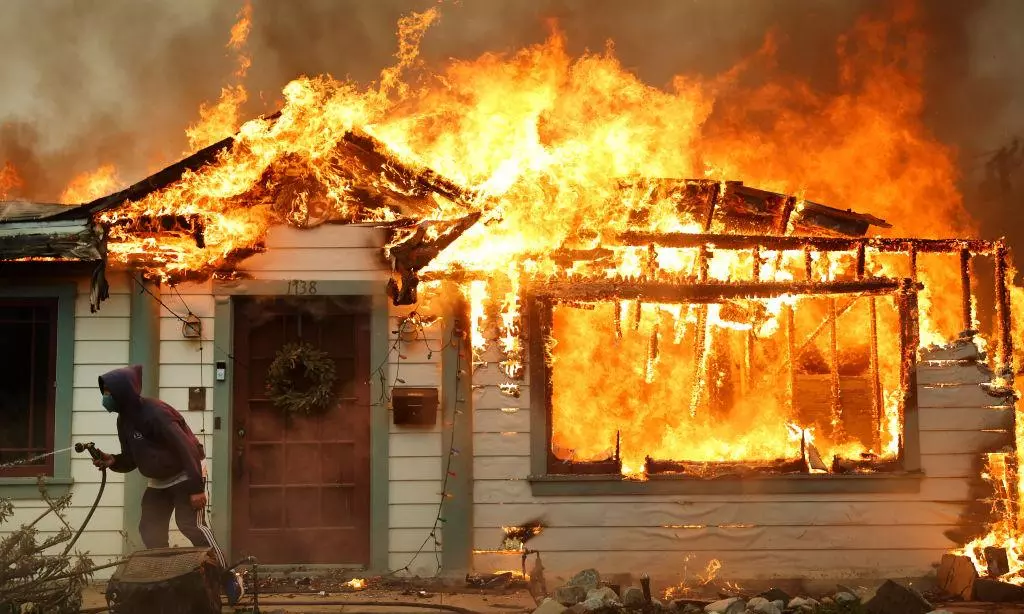
Natural disasters call for empathy, not judgement
text_fieldsIn the wake of natural disasters, a common yet troubling narrative emerges: that such events are divine punishment for societal wrongs. This rhetoric, whether applied to the recent wildfires in California or other global tragedies, not only lacks theological grounding but also fosters division, blame, and moral apathy. As a society, we must move beyond such simplistic interpretations and instead focus on the shared humanity that unites us, regardless of faith or belief.
There is a tendency to see disasters as retribution for perceived societal or political wrongs, particularly when the affected regions are wealthy or powerful. Such responses betray a lack of empathy and a dangerous oversimplification of global injustices.
This perspective is disingenuous because it frames disasters affecting one's own community as a "test" of faith while labelling similar events impacting others as "divine punishment."
Religious traditions across cultures remind us that natural disasters are not targeted punishments selectively inflicted on sinners. The Qur’an advises, “Do not let the hatred of a people prevent you from being just. Be just; that is nearer to righteousness” (5:8). Similarly, Hindu teachings emphasize ahimsa (nonviolence) and compassion, while Jesus rejected the notion that tragedies are divine judgment against sinners (Luke 13:1-5).
The randomness of disasters defies the logic of targeted punishment. In California, wildfires consumed homes, mosques, churches, synagogues, and temples alike, affecting the religious and secular, the rich and poor, indiscriminately. If natural events were acts of divine judgment, why would places of worship burn alongside other structures? This randomness highlights that such tragedies are the result of natural processes, not divine wrath.
Natural disasters are products of physical and environmental laws, often worsened by human activities. Climate change, driven by deforestation, pollution, and unregulated industrialization, has amplified the frequency and intensity of extreme weather events worldwide. In India, where floods, droughts, and cyclones increasingly devastate communities, the need for environmental accountability is urgent.
Rather than blaming natural disasters exclusively on divine will, this is a moment to reflect on humanity’s collective responsibility for the environment. Across cultures, religious traditions emphasize stewardship of the Earth. These teachings underscore a universal ethical mandate to protect our planet for future generations.
In India, where natural disasters frequently impact vulnerable populations, this mindset would be unthinkable. We grieve for those affected by floods in Kerala or cyclones in Odisha, regardless of their religious, social, or political affiliations. The same compassion must extend to all tragedies, whether in the Palisades or Palestine.
Drawing parallels between systemic injustices and natural disasters is flawed. The suffering in places like Gaza results from deliberate policies, while wildfires, though tragic, are part of a natural cycle exacerbated by environmental neglect. Rejoicing in another’s misfortune, even out of frustration with global inequities, only perpetuates cycles of inhumanity and division.
In moments of crisis, our response reveals our values. Religious and secular ethics alike emphasize the importance of compassion and solidarity. The secular reading of spiritual teachings highlights a universal truth: that suffering, while often beyond our control, demands a humane and empathetic response.
Philosophers and theologians have long argued that suffering tests not only those directly affected but also those who witness it. Disasters challenge us to rise above pettiness, reject narratives of blame, and respond with humility and care. This perspective transcends faith, reminding us of the interconnectedness of humanity.
Speculating about divine intent in disasters distracts from the real work of addressing their causes and consequences. Whether we approach the issue from a faith-based or secular lens, the call to action is clear: to mitigate climate change, provide aid to those in need, and foster solidarity across communities.
In India, where religious diversity shapes public life, this message is particularly important. Natural disasters do not discriminate based on creed or class. Neither should our responses. Instead of dividing ourselves by belief or ideology, let us unite in the shared responsibility of rebuilding and preventing future tragedies.
The Los Angeles wildfires, like the floods and cyclones in India, remind us of our shared vulnerability. These events are not punishments but stark warnings about our collective fragility and the urgent need for action. Let us reject the temptation to assign blame and instead embrace the values of empathy, responsibility, and justice.
This perspective, grounded in both secular ethics and the universal messages of religious traditions, calls us to respond to tragedy not with speculation but with humanity. By doing so, we honour the best of what binds us as a global community, transcending differences to address the challenges of our time.
Faisal Kutty is a Toronto-based lawyer and regular contributor to The Toronto Star. His articles also appear in Newsweek, Aljazeera, Zeteo, and Middle East Eye. You can follow him on X @faisalkutty)























